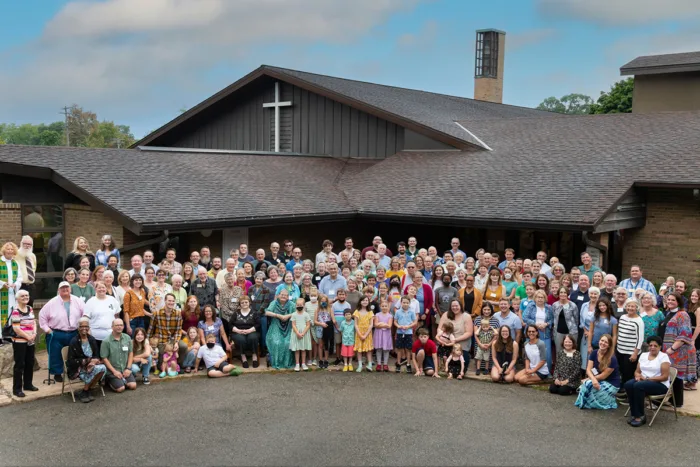
All Saints Episcopal Church in East Lansing, Michigan, is engaging in a range of justice efforts as part of a racial reparations plan approved in May. Photo: All Saints via Facebook
[Episcopal News Service] All Saints Episcopal Church in East Lansing, Michigan, has committed to donating at least $130,000 – half of the proceeds from the sale of its rectory – to help close the racial wealth gap in central Michigan.
Until the federal Fair Housing Act passed in 1968, realtors intentionally blocked Black buyers from purchasing homes in nearby Lansing, Michigan’s capital, resulting in a property wealth disparity that remains today. Another factor was the discriminatory practice known as redlining, rooted in federal policies dating to the 1930s, in which banks nationwide were discouraged from lending to residents in neighborhoods deemed “hazardous” to investment, often because people of color lived there.
The Rev. Kit Carlson, All Saints’ rector, told Episcopal News Service that the church had started in 2021 looking into doing reparations work in response to such examples of racial injustice. At the same time, retired entomologist Willye Bryan founded the Justice League of Greater Lansing Michigan, a nonprofit dedicated to removing racial disparities by establishing an endowment fund via donations from individuals, churches and other faith-based organizations.
All Saints recently closed on the sale of its rectory for $260,000 and, with unanimous consent by the church’s vestry, pledged to give half, or $130,000, to the Justice League of Greater Lansing Michigan’s reparations endowment, which will locally support Black homeownership and startups by Black entrepreneurs, as well as provide scholarships for Black students. The donation from the rectory sale was part of a broader reparations plan that the vestry approved in May by vote. The church will donate the money to the Justice League of Greater Lansing Michigan during a worship service scheduled for Aug. 20.
All Saints also participated in a public event hosted by the Justice League of Greater Lansing Michigan on Juneteenth — June 19 — at the Michigan State Capitol in downtown Lansing, to apologize for The Episcopal Church’s historical role in perpetuating racism. Michigan Bishop Bonnie Perry spoke about racial reconciliation at the event, alluding to Isaiah 58:12 in calling it a step toward “repairing a malignant breach in our country.”
“Historically, The Episcopal Church has been the church of the powerful and the elite and the money,” Carlson said. “If Episcopalians look into their history, you will find that this majority-white Episcopal Church has disproportionately benefited from the oppression of people of color.”
In the state of Michigan, 80% of white residents own their homes, but the rate of homeownership is nearly half that for Black residents, according to the National Association of Realtors.
East Lansing is notably the home of Michigan State University, which provides extensive free resources online for researchers to learn more about the history of Michigan and how it was impacted by redlining. In 2018, the city formally apologized for its decades-long history of racism and housing discrimination.
“I looked at houses in the formerly redlined areas of Lansing, and a house like our rectory, same age, same number of bedrooms, was selling for about $80,000, and our rectory selling for $260,000,” Carlson said. “That’s just a visible example of the racial wealth gap. (White) people were able to build home equity here in East Lansing, and African Americans were excluded.”
Civil rights leader Malcolm X, then known as Malcolm Little, moved to a predominantly white neighborhood in Lansing when he was a toddler. The Little family’s home burned down in what was “most likely an arson attack by white supremacists,” according to John Aerni-Flessner, a professor of African and world history at MSU.
“Having a home is considered an asset, which plays a huge role in the long term,” said Prince Solace, president the Justice League of Greater Lansing Michigan and director of congregational life and community outreach at Lansing First Presbyterian Church, told NBC-affiliate WILX. “Not having assets and not having homeownership can leave a lot of African Americans in a position where they can’t build intergenerational wealth.”
Edgewood United Church, a United Church of Christ parish in East Lansing, has also pledged to donate at least $100,000 to the Justice League of Greater Lansing Michigan.
Carlson said that, as part of the church’s broader reparations plan, All Saints also is starting to collaborate with the Nokomis Cultural Heritage Center in neighboring Okemos and plans to donate $10,000 to help support local indigenous causes.
“My hope is that our work at All Saints will inspire other Episcopal churches to start doing this work, too, because it’s been profoundly meaningful to our congregation and especially meaningful to our younger members,” Carlson said. “We want to be someplace where we don’t just talk about doing the work, but where something actually happens.”
-Shireen Korkzan is a reporter and assistant editor for Episcopal News Service. She can be reached at skorkzan@episcopalchurch.org.

